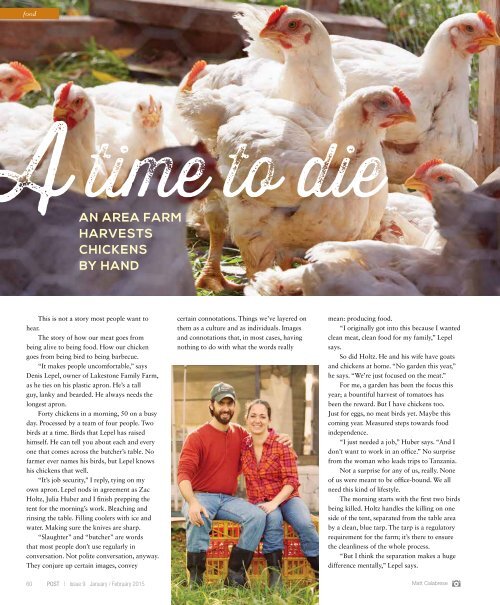Create successful ePaper yourself
Turn your PDF publications into a flip-book with our unique Google optimized e-Paper software.
food<br />
An area farm<br />
harvests<br />
chickens<br />
by hand<br />
This is not a story most people want to<br />
hear.<br />
The story of how our meat goes from<br />
being alive to being food. How our chicken<br />
goes from being bird to being barbecue.<br />
“It makes people uncomfortable,” says<br />
Denis Lepel, owner of Lakestone Family Farm,<br />
as he ties on his plastic apron. He’s a tall<br />
guy, lanky and bearded. He always needs the<br />
longest apron.<br />
Forty chickens in a morning, 50 on a busy<br />
day. Processed by a team of four people. Two<br />
birds at a time. Birds that Lepel has raised<br />
himself. He can tell you about each and every<br />
one that comes across the butcher’s table. No<br />
farmer ever names his birds, but Lepel knows<br />
his chickens that well.<br />
“It’s job security,” I reply, tying on my<br />
own apron. Lepel nods in agreement as Zac<br />
Holtz, Julia Huber and I finish prepping the<br />
tent for the morning’s work. Bleaching and<br />
rinsing the table. Filling coolers with ice and<br />
water. Making sure the knives are sharp.<br />
“Slaughter” and “butcher” are words<br />
that most people don’t use regularly in<br />
conversation. Not polite conversation, anyway.<br />
They conjure up certain images, convey<br />
certain connotations. Things we’ve layered on<br />
them as a culture and as individuals. Images<br />
and connotations that, in most cases, having<br />
nothing to do with what the words really<br />
mean: producing food.<br />
“I originally got into this because I wanted<br />
clean meat, clean food for my family,” Lepel<br />
says.<br />
So did Holtz. He and his wife have goats<br />
and chickens at home. “No garden this year,”<br />
he says. “We’re just focused on the meat.”<br />
For me, a garden has been the focus this<br />
year; a bountiful harvest of tomatoes has<br />
been the reward. But I have chickens too.<br />
Just for eggs, no meat birds yet. Maybe this<br />
coming year. Measured steps towards food<br />
independence.<br />
“I just needed a job,” Huber says. “And I<br />
don’t want to work in an office.” No surprise<br />
from the woman who leads trips to Tanzania.<br />
Not a surprise for any of us, really. None<br />
of us were meant to be office-bound. We all<br />
need this kind of lifestyle.<br />
The morning starts with the first two birds<br />
being killed. Holtz handles the killing on one<br />
side of the tent, separated from the table area<br />
by a clean, blue tarp. The tarp is a regulatory<br />
requirement for the farm; it’s there to ensure<br />
the cleanliness of the whole process.<br />
“But I think the separation makes a huge<br />
difference mentally,” Lepel says.<br />
60 <strong>POST</strong> | Issue 9 <strong>January</strong> / <strong>February</strong> <strong>2015</strong><br />
Matt Calabrese


